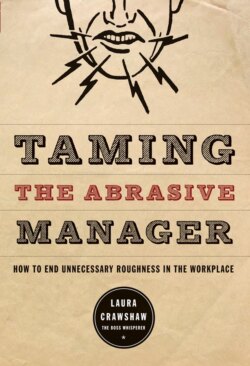Читать книгу Taming the Abrasive Manager - Laura Crawshaw - Страница 14
A Bleeding Heart Is Born
ОглавлениеEnough of the hard stuff—let’s get back to my soft-hearted goal of reducing workplace suffering caused by abrasive bosses. As I read this, I realize that I may be giving the mistaken impression that I aspire to be the Mother Theresa of executive coaching, which is not the case. I don’t do what I do because I am divinely inspired or in the least bit noble. It’s my parents’ fault—I blame them.
Too often parents are blamed for everything that we don’t like about ourselves, but I am pleased to blame my parents for teaching me that the most important use of one’s life lies in helping others. I learned about suffering from my psychiatrist father and hospital volunteer mother—not at their hands but through their hearts and eyes. I was blessed with a safe, loving home and only encountered suffering as I ventured out into the wider world.
My earliest lessons of suffering were taught by animals. When I was very little, my mother took me to a Tarzan movie where a mortally wounded elephant slowly found its way to the elephant graveyard to die. The pain and sadness that reverberated through me was excruciating—I was distraught. I remember my mother’s efforts to comfort her sobbing child, wiping my tears away, assuring me that the elephant was just acting and that it had been given a special treat of canned dog food once it finished ‘‘playing pretend.’’
A later experience of intense suffering also involved animals. I must have been six or seven years old, and my father, founder of a local children’s mental health clinic, hosted a charity carnival to raise funds for the clinic. It was a typical rainy day in Oregon, and the carnival had a kiddy ride with ponies tied to a rotating frame. I remember the wet, downcast ponies, trudging around and around in a circle of mud, and to this day the memory cuts through me like a knife. I believed they wanted to be free (or at least loved) instead of being chained to a muddy merry-go-round for human entertainment. I felt terribly sad, knowing that I could do nothing to relieve their suffering. I believe this childhood experience of helplessness in the face of suffering formed the foundation for my adult wish to reduce suffering by eventually becoming a psychotherapist and, later, an executive coach.
Intent on becoming a psychiatrist, I embarked on a premed track in college. As I wrestled with my courses, it gradually dawned on me that I was never going to succeed as a physician because, frankly, I didn’t have the patience or interest to memorize every bone, sinew, and organ of the human anatomy. I figured it would be pretty unethical to even consider the practice of medicine if I wasn’t willing to memorize everything (‘‘I’m sorry sir, but I’m hesitant to remove your appendix because I never bothered to learn what it’s connected to’’). I wanted to study psyche, not physique, and was fortunate enough to discover that I could become a psychotherapist without pursuing a medical degree. So I abandoned my medical pretensions and instead pursued a degree in clinical (or what was then called psychiatric) social work.
